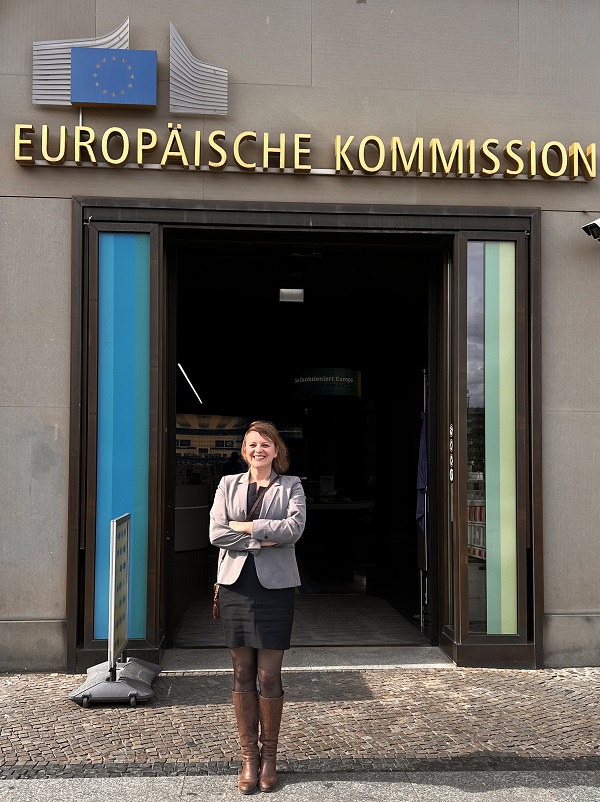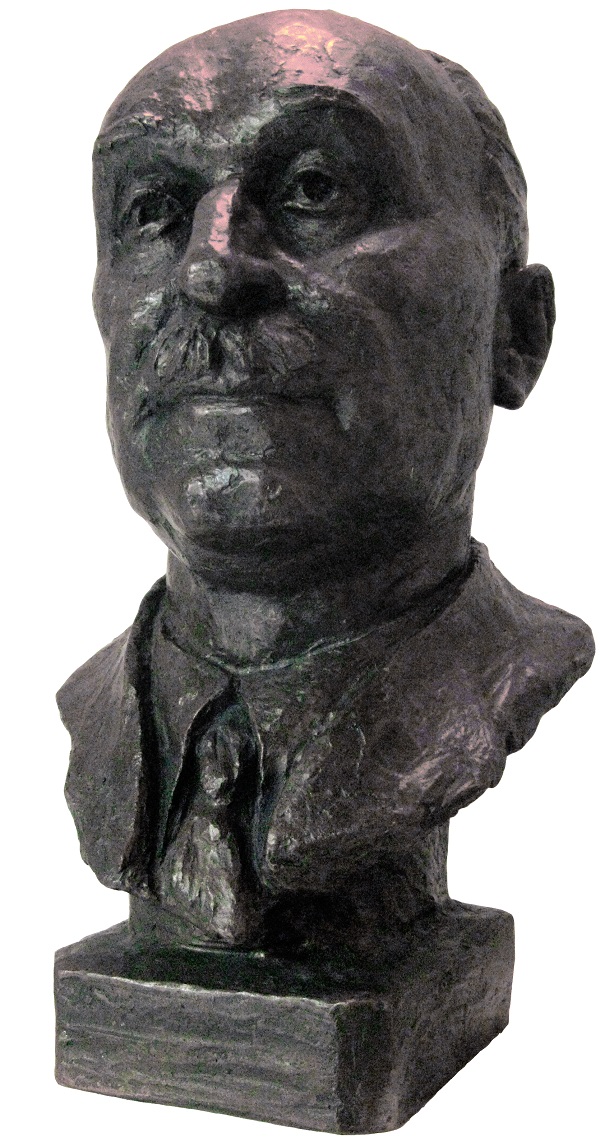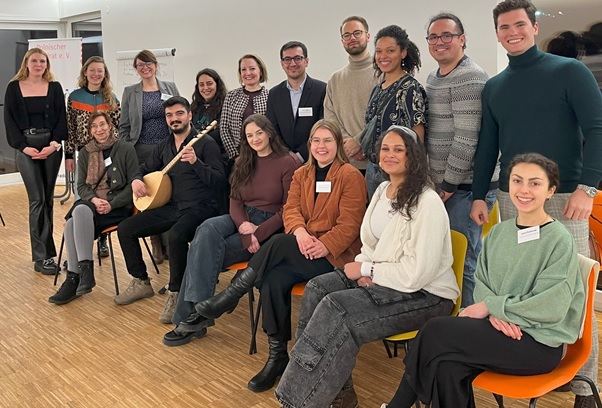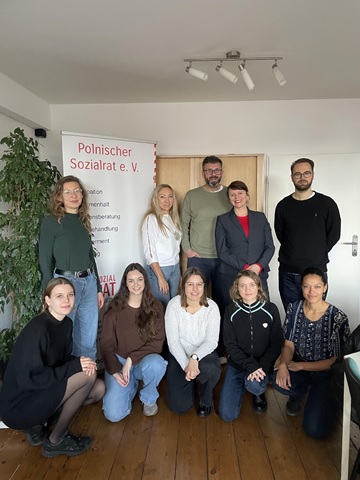Jean Monnet Actions
Jean Monnet Module
Lecturer
Dr. Kamila Schöll-Mazurek – Political Scientist, academic staff member at the Viadrina Center for Polish and Ukrainian Studies, where she taught as a Jean Monnet Program lecturer and led scientific projects. Expert in migration, integration, and diversity. Since 2011, she has been a member of the board of the Polish Social Council in Berlin, and since 2019, the director of the Intercultural Contact and Advisory Center for Migrants (particularly from Eu-countries) in Berlin. From 2024, she will be the Federal Managing Director and strategic leader of the Cooperation Network for Equal Opportunities, Participation, and Diversity-Oriented Opening in Migration Society (Project of the Federal Ministry of Education, Family Affairs, Senior Citizens, Women and Youth) within the Polish Social Council. She is the initiator and spokesperson of the Polish Federal Network for Participation and Social Part of Europe at the federal level. She advocates for the improvement of the situation of EU citizens and migrants in Germany in relation to Berlin, Polish, and federal German politicians, and advises political and civil society actors on these issues. Her research interests include EU freedom of movement, social inequalities, discrimination, participation and integration policies, as well as German-Polish families from an intergenerational perspective – co-author of the book "Children of German-Polish Relationships: Identity and Nationality" on this topic (Routledge, 2025).
E-Mail: schoell-mazurek@polskarada.de

The Jean Monnet actions offer opportunities in the field of higher education and in other fields of education and training. The Jean Monnet actions contribute to spreading knowledge about the European Union integration matters. The Jean Monnet Programme promotes excellence in teaching and research on Europe and European integration processes.
Read more: https://erasmus-plus.ec.europa.eu/de/programme-guide/part-b/jean-monnet-actions
We don't unite states, we unite people.
Jean Monnet

Jean Monnet bust in the Peace Palace
“Onboarding in Europe? Social Cohesion in a Diverse Europe. Strategies, Controversies, the Future”
In the project "Onboarding in Europe? Social Cohesion in a Diverse Europe. Strategies, Controversies, the Future," the conviction of Jean Monnet that European integration cannot be achieved through the imposition of state borders or political treaties was internalized. Just as one of the fathers of the EU believed that European integration can be achieved through the promotion of human relationships, exchange, and understanding at all levels—culturally, economically, and socially—so we acted within the framework of the course for three years. We also examined and continued the idea of Jean Monnet.
What does the demand for human relationships mean today? Is Europe honest with itself when we say that we want to integrate? Who wants to integrate? Who is not included? How do we deal with the hurdles and barriers to participation and social integration of the original non-Europeans? Are citizens of the EU, whose countries joined the EU in 2004, treated equally in Western Europe? And ultimately, how can we create the conditions to welcome people from other cultures, religions, and regions in Europe? Whoever finds these answers deserves a Nobel Peace Prize, because we need these answers more than ever today. Growing right-wing extremism and interethnic conflicts present many challenges. However, the lecturer and the students set out to find the answers.
In the project, we visited migrant organizations, spoke with experts, learned moving migrant biographies, and stories of organizations that have been advocating for the rights of migrants for years and dealing with "onboarding" for them. As a result, several dozen students deepened their knowledge of integration and participation, and many encounters took place, which this website reports on. We invite you to read it.
Summer Semster 2022

Foto: Kamila Schöll-Mazurek, eigenes Archiv
Following the first phase of implementing the Jean Monnet Module at the European University Viadrina 2016-2018, we were able to launch a new program in 2022 thanks to the renewed grant. Experiences from 2016-2018 had already shown that a mixed teaching format, study visits, conversations with migrants and politicians, and theoretical content enrich students with a practical perspective that is highly valued in today's job market. This semester, we began our search for the best method for "onboarding" migrants from the ground up by organizing low-threshold meetings with the migrants themselves and organizations that offer them counseling. We met with the director of the migrant support center Kotti e.V. During the sessions, we discussed what integration and democracy mean in a migrating society to confront theory with practical implementation by the integration officer, Katharina Niemiedzial, during a visit to her office. We also examined the legal instruments supporting "onboarding" – here, the Gesetz zur Neuregelung der Partizipation im Land Berlin is undoubtedly one of them. On this occasion, we also met students from the social work department in Würzburg, whose lecturer presented interesting concepts of resilience for regular services at the meeting. We considered what should be improved in the operation of refugee reception centers, which are one of the instruments of "onboarding" for us. We met with representatives of the academic world during a visit to the Deutsches Zentrum für Integrations- und Migrationsforschung (DeZIM) and learned about new concepts of "onboarding" as well as ideas of conviviality in the project Vision: Envisioning Convivial Europe. We discussed our observations during a political picnic at Flussbad e.V., learning about the possibilities of civic protest through the example of this association's activities.
Within the framework of the seminar 'Onboarding in Europe' at the Europa-Universität Viadrina, we discussed and gathered knowledge on equal participation, access, representation, and various methods of onboarding with a variety of stakeholders.
In July, we organized an interactive political picnic at Flussbad Berlin e.V. to bring together the different stakeholders in this new format. We exchanged perspectives, debated, and set new impulses for the future of political self-representation by and for people with migration backgrounds.
As part of our seminar Onboarding in Europe, we visited a research institute: Dezim Institute – German Center for Integration and Migration Research in Berlin. Anthropologist Piotr Goldstein welcomed us warmly and presented his work on migration, activism and civil society.
Initial reception facilities are the first stop for refugees in Germany and therefore also the first stop in the onboarding process. The location therefore plays a decisive role in the arrival process.
There is no consensus in the scientific community regarding the concept of integration. "Integration is understood either as a process, a function, or a goal" (Fincke 2009:41).
There are numerous theories, opinions, and evaluations regarding the concept of integration. In this context, the terms assimilation and acculturation are frequently used. Below, I will present central integration theories and critically examine and question the concept.
Kotti e.V. has been working in the area around Kottbusser Tor in Kreuzberg since 1986. Through its community work, the district centre aims to address socio-cultural processes, identify needs and develop appropriate services for local residents, while also helping them to network with each other. The association relies on a network of independent activities, cooperation and support, and follows the motto: have a say, get involved, help shape the future.
On 16 June 2022, students from the master's seminar "Onboarding in Europe? Social cohesion in a diverse Europe. Strategies, Controversies, Future." at the European University Viadrina met with the coordinator of the Kotti e.V. neighbourhood centre and a representative of KOTTImobil in the family garden in the city centre to discuss the community work of Kotti e.V.
This article is the result of a meeting with the Turkish Community in Germany (TGD) – a migrant organisation that is not only active in the field of political advocacy, but is also committed to ‘the qualification of migrant organisations, the promotion of civic engagement and the improvement of the educational situation of disadvantaged young people’ (TGD).
The aim of the seminar is to learn about and examine theoretical concepts of integration and social cohesion as well as best practice solutions. In order to critically engage with these topics, it is also necessary to critically examine the conditions of inequality and oppression. For this reason, I will introduce the concept of intersectionality below, as it allows social categories such as gender, ethnicity, nation or class to be conceptualised not only in isolation from one another, but also in their interconnections. This is not simply a matter of taking multiple social categories into account, but rather of analysing their mutual interactions.
Thoughts on how to face global and European socio-political issues in the 21st century era
“Without questioning nothing works”, is a statement I retrieved from a video on the European Forum Alpbach (EFA) website – a platform that fosters ideas for an empowered and democratic Europe (EFA 2022). I find it a striking argument and would like to add another dimension to it: Global and European socio-political issues cannot be solved when they are not questioned within an interdisciplinary approach.
Together with the students of the Master's program "International Social Work with Refugees and Migrants" at the Würzburg-Schweinfurt University of Applied Sciences, the course "Onboarding in Europe? Social Cohesion in a Diverse Europe. Strategies, Controversies, Future." of the Europa-Universität Viadrina met with the Commissioner for Integration and Migration of the Berlin Senate, Katharina Niewiedzial, on July 8, 2022, to discuss this office together.
Together with students from the master's programme ‘International Social Work with Refugees and Migrants’ at the University of Applied Sciences Würzburg-Schweinfurt, the course "Onboarding in Europe? Social Cohesion in a Diverse Europe. Strategies, Controversies, Future.‘ at the European University Viadrina on 8 July 2022 to discuss the ’Law on the Reorganisation of Participation in the State of Berlin" with Katharina Niewiedzial, the Berlin Senate Commissioner for Integration and Migration.
Winter Semester 2023/24

The second semester of the Jean Monnet course, like the first, was successful among students. Together, over the course of five months during the autumn-winter period, we organized our own event with the participation of representatives from migrant organizations, the Berlin administration, and politics. Thematically, our focus was on security as a necessary condition for migrants and the host society to create the conditions for full trust and coexistence. The starting point was the attack on Kurdish refugees at the Berlin refugee reception center. This semester also provided the opportunity to participate in two formats discussing the possibilities of "Onboarding" - in the annual symposium of the Federal Conference of Migrant Organizations and the Berlin Conference of Migrant Organizations, where the future of social cohesion in Germany and Europe and its barriers were discussed. During the sessions, we also reflected on the significance of civic education and the lack of a home for social cohesion. We also looked at other countries, such as Denmark and Australia, and their solutions in the field of reception and migration policy. We also responded to the latest legal changes - in Germany, this was the introduction of the Skilled Immigration Act. We discussed this topic with an expert. From these reflections, student works emerged, which we invite you to read and listen to on this website.
Immigration is a significant topic that can vary greatly among different countries. Particularly in Western countries, there is a pressing need for skilled labor due to shortages. However, each country has its own approaches, which are often influenced by cultural and societal attitudes. This blog post examines the process of onboarding through the case studies of Australia and Denmark, focusing solely on regular migration driven by work.
The term "onboarding," originally from human resource management, describes the integration of new employees into a company to facilitate their transition (Godinho 2023:2). However, in this context, the term is expanded. "Onboarding" here refers to the integration of immigrants not only into the workplace but also into the society of the respective country. How does this integration of new foreign workers into Australian and Danish society look? What challenges or successes are there from the perspective of the immigrant, the society, and the economy? Katja Willma addresses these questions in her essay "Onboarding in Australia and Denmark."
The best way to learn is through direct contact – and that's exactly what we experienced when we visited the Polish Social Council. At their premises in Berlin Kreuzberg, we learned how the association helps Polish migrants in Germany with questions about the social welfare system. The symbolic location of this Polish-run institution in the multicultural heart of Berlin is also significant.
1.12.2023, Alissa Dovgucic, Vanessa Czerwionka, Kamila Kokoschka
In the heart of the vibrant metropolis of Berlin, the 5th State Conference of Migrant Organisations took place on 1 December under the title ‘Between flagship projects and crises – the impact of MOs on Berlin’ – an event that impressed not only with its depth of content, but also with its atmosphere of warmth, informality and openness.
Carlotta Trunk
The eighth Federal Conference of Migrant Organizations (BKMO) took place on December 4-5 at the Global Village in the Neukölln district of Berlin. The conference began with an internal session focusing on the founding processes, current structures, and future developments of the BKMO.
Under the guiding theme "Security as a Prerequisite for the Integration and Participation of Migrants – What Contributions Can Politics, Administration, and Civil Society in Berlin Make?", an event took place on Friday, January 26, 2024, at the Kreuzberger Kinderstiftung. The event brought together representatives from politics and migrant organizations. The event was organized by the seminar group of the Viadrina course "Onboarding in Europe? Cohesion in a Diverse Europe. Strategies, Controversies, Future", whose project leadership was undertaken by Dr. Kamila Schöll-Mazurek as part of the Jean Monnet Program of the European Commission.
Today, we are addressing the question of whether the Skilled Immigration Act is a solution to combat the skilled labor shortage in Germany. We will discuss the Skilled Immigration Act with expert Marek Scheier. Marek Scheier is a graduate economist and is involved, among other things, in his startup Talents2Germany for the acquisition of skilled workers from abroad. Particularly affected by the skilled labor shortage are the sectors of crafts, MINT, or health, care, and education. According to Statista, the number of vacant positions in 2023 is approximately 760,000.
As part of the seminar, an interview in the form of a podcast was prepared, which can be listened to here – we invite you to listen!
Is political education created for everyone? What challenges face on-site political education and critical political education? How can we democratically ensure that civic education is created and co-created by the interested parties themselves? In her work based on interviews with experts at the federal level, Luisa Pastrnak analyzes these questions and provides clear answers. Citizens – all – should have the right and the opportunity to think about the shaping of society. Instead of a universally valid concept, political education should be understood as a process that must continually adapt to new societal conditions and challenges. As the author writes: „There is no single political education for all. For good political education practice, from which as many people as possible can benefit, a variety of approaches, methods, and approaches are needed.
However, there will not be one political education for all; it must always be tailored to the target group and co-created with them. We invite you to read.
Access to adequate housing, however, presents a significant challenge. Often, refugees face difficulties such as financial barriers, discrimination in the housing market, or lack of support in finding accommodation. This large discrepancy between administrative regulations regarding the duration of stay in accommodations and everyday reality has so far received neither political nor media attention commensurate with the importance of the issue. Often, societal discussions focus solely on the accommodation of asylum seekers. The large number of residence-permitted homeless people, who often live in district accommodations for eight years or more, receives little attention. Carlotta Trunk conducted interviews and collected data on the barriers and housing situations for refugees and their integration. Having one's own home is one of the tools of "onboarding". We invite you to read!
Summer Semester 2024
The seminar in the summer semester of 2024 was marked by many anniversaries important for Europe. There were also various developments in Europe and the opportunity to participate in public events. In 2024, it was the anniversary of many countries joining the EU. At the same time, elections to the European Parliament were also held. This fact also gave an impetus to address the issue of climate and the growing xenophobia in Europe. Therefore, these topics accompanied the work of the students. We continued to address the question of how, in an era of racism in Europe and a worsening climate situation, we can ensure the solidarity needed in the culture of welcoming and creating tools for social onboarding.
Within this semester, we also celebrated the expansion of the EU and epoch-making experiences. We participated synergistically in the ceremony marking Poland's and other countries' accession to the EU at the French Institute in Berlin. We also took part in an expert seminar on combating racism at DEZIM, which was part of the Migration Policy Center's project: Tackling Structural & Institutional Racism in 8 EU Member States. We organized a debate on the Polish-German treaty and participated in the conference "Diversity must be learnt" on September 16, 2024, which was organized as part of the Includate project and funded by the Erasmus+ program.
The final seminar in the series concluded with a pleasant surprise for the students. The leading lecturer of the Jean Monnet Program, Dr. Kamila Schöll-Mazurek, received a certificate of appreciation for conducting the seminar. This certificate of appreciation is primarily attributed to Jean Monnet and other pioneers, thanks to whom we can learn about the development of democracy in Europe in peace.
On May 8, 2024, we celebrated the 20th anniversary of the EU Eastern Enlargement together with the EU Equality Body at the Institut Français in Berlin. The event, focused on European unity, included diverse panel discussions, moving greetings, and a final collection of wishes for Europe's future, as well as a look ahead to this year's EU elections and the shaping of a common Europe. You can read the program here.
Together with the guests, the students of the Jean Monnet Module course celebrated. They supported the event by preparing documentation and creating Instagram videos.
An Exposition on a Historical Event
An exposition on a historical event can take various forms. This year, the NABU (Nature and Biodiversity Conservation Union) is celebrating its 125th anniversary and, in conjunction with the European Parliament elections in the European Union, is serving as the patron for its discussion series with the event "Europa wählt – Zusammen für die Wiederherstellung der Natur" (Europe Votes – Together for the Restoration of Nature). This event represents animals and plants, taking responsibility for the peaceful cooperation between humans and nature.
In cooperation with BirdLife Europe, BirdLife Central Asia, the Polish organization OTOP, and the Europa-Universität Viadrina, they highlight the importance of cross-border work through examples from nature conservation associations and volunteer helpers from Poland and Ukraine. The cooperating members also emphasize how crucial the support of the European Union is for a free civil society in a democratic Europe.
During the seminar, students also considered whether agreements between two countries are a good solution for onboarding migrants from a given country. We assumed that not only the regulations of the host country, such as the participation law of the federal state of Berlin, can create a framework for a better life and care for the needs of migrants, but also intergovernmental agreements. As a case study, we took the Polish-German treaty on friendly cooperation. This treaty has not been renewed for a long time, and we were curious whether it would be worth adding an annex to this 35-year-old treaty, following the example of the treaty between France and Germany from 2019. To answer this question, we discussed it on Zoom. We invite you to watch the recording of the debate, which was attended by Prof. Jan Barcz, Senator Piotr Masłowski, Dr Kamila Schöll-Mazurek, Brygida Helbig, Adrianna Tomczak, Joanna Szymanska-Bica and moderated by Marcin Antosiewicz.
Representatives from political work on the topic of racism, as well as migrant organizations, discussed possible anti-racist measures and the current situation in political institutions at the German Center for Integration and Migration Research (DeZIM) in May 2024. These conversations are crucial for illuminating the diverse challenges and dimensions of combating racism and developing sustainable solutions.
Summary of the Discussion in the Small Group on the Legal Situation, 14.05.2025, Zoe Lay
At the small group discussing the legal situation regarding anti-racism in Germany during the seminar 'Discussion Workshop on the Status of Anti-Racism in Germany,' the jurist Demet Demir, a member of the Postmigrant Jurist*innenbund and a scientific employee at the University of Hamburg and the BSP Business & Law School Berlin, and Jana Michael, the integration officer of the state of Mecklenburg-Vorpommern, participated. The discussion round was documented by Zoe Lay, a legal trainee at the Berlin Chamber Court and a student in the Master's program European Studies at the Europa-Universität Viadrina.
The results of the group's work can be found here: Rassismus als hinderliches Element für eine bessere Integration von Migrant*innen? Zusammenfassung der Diskussion in der Kleingruppe zur Rechtslage, Zoe Lay
With the support of the Erasmus+ Programme of the European Union
